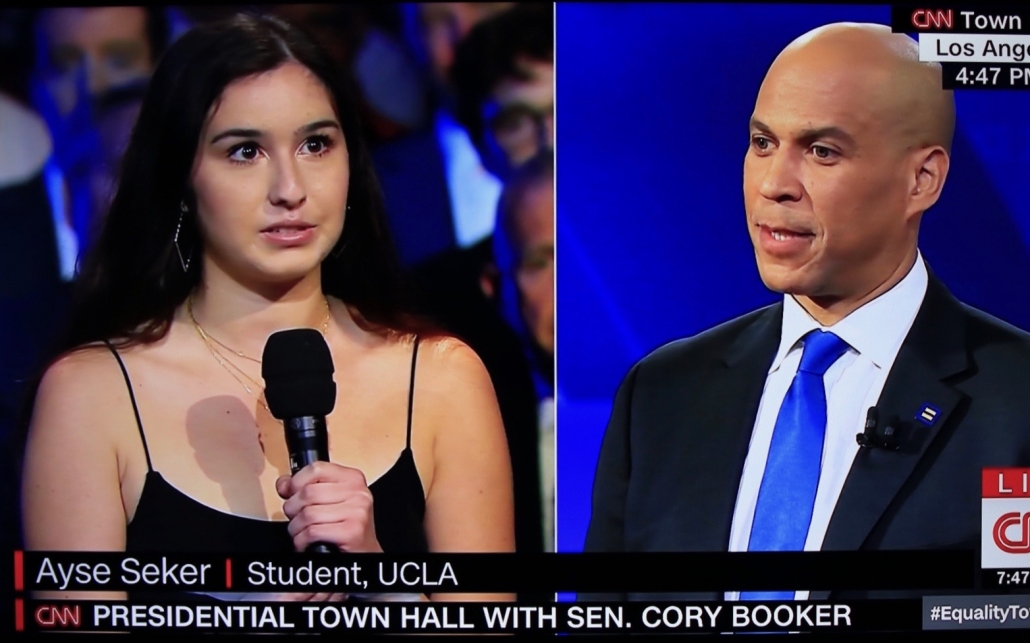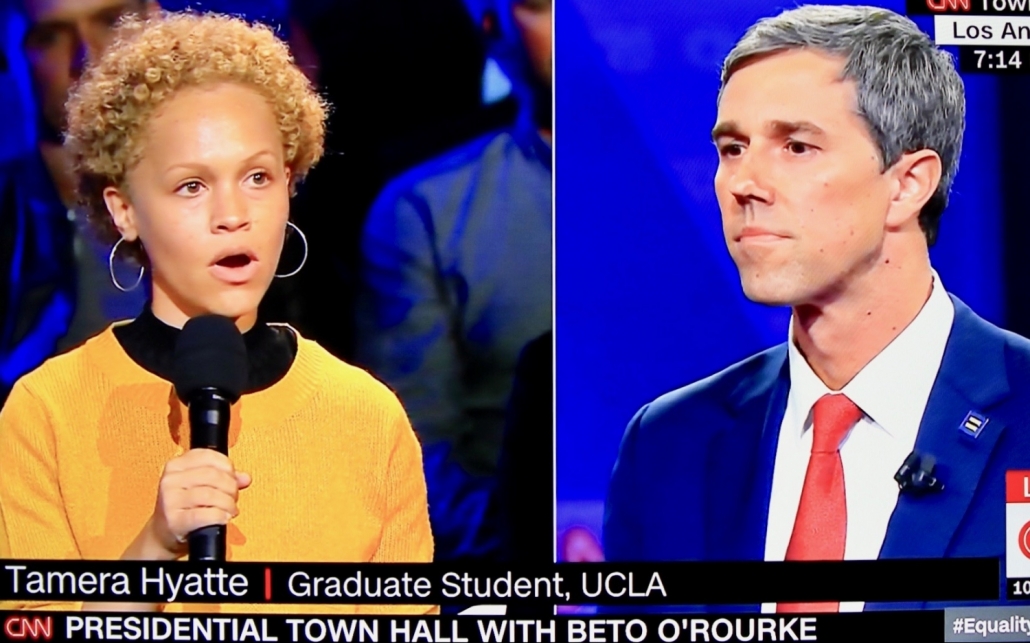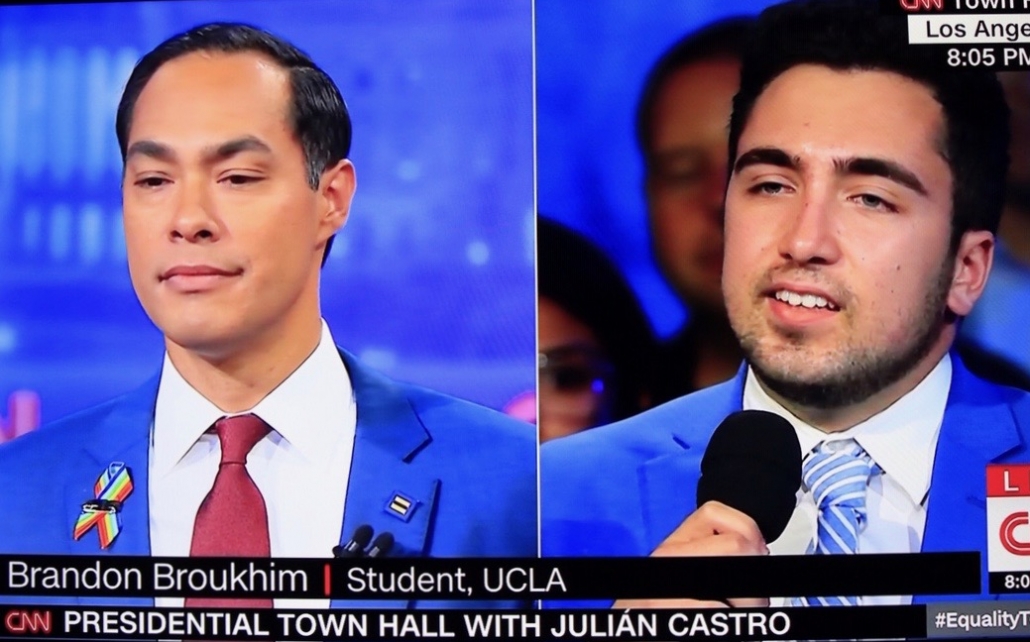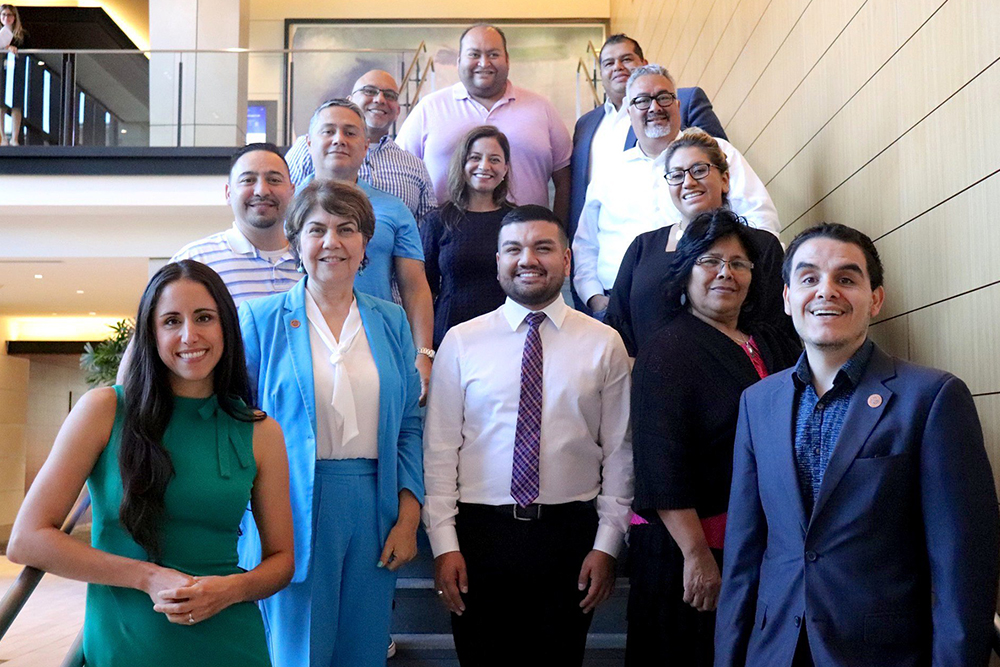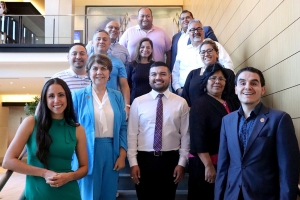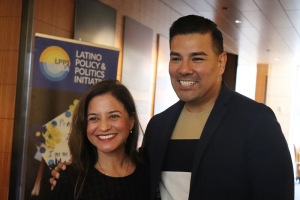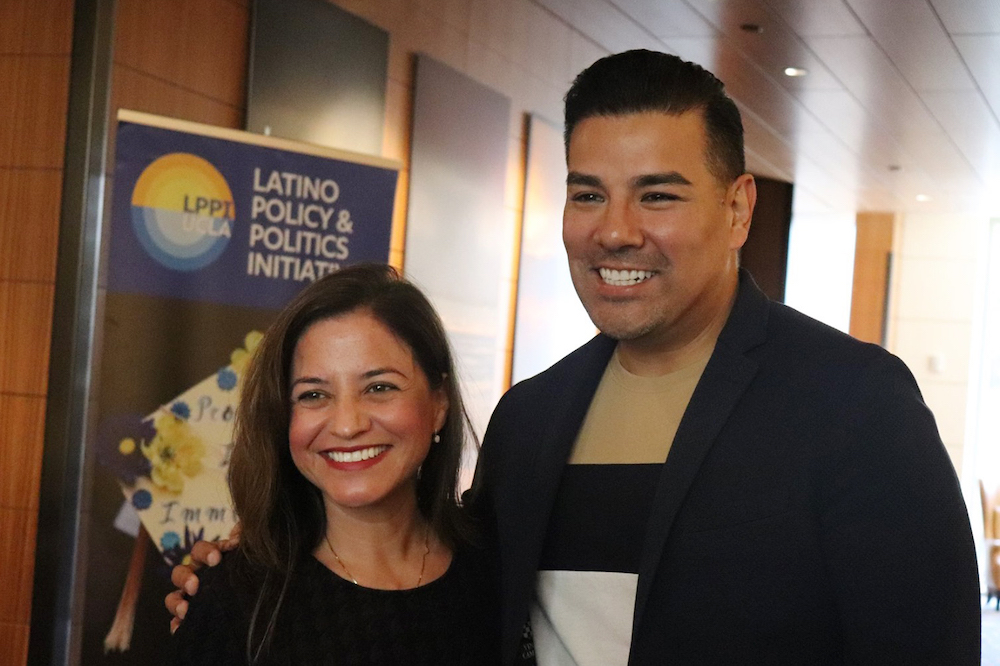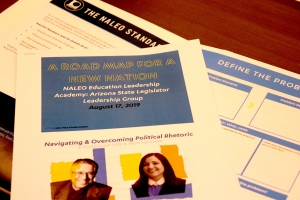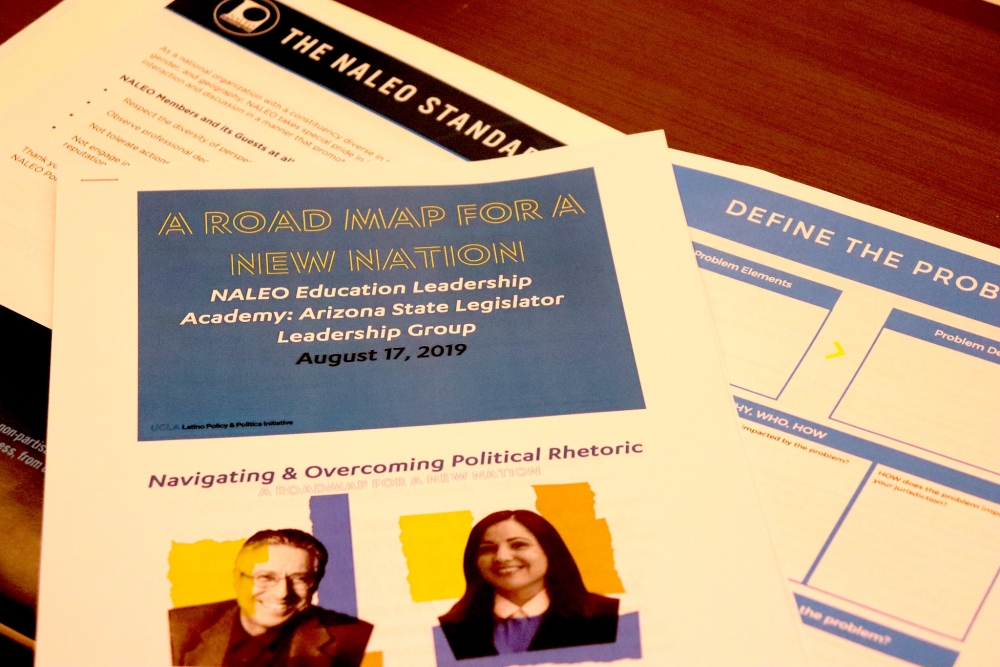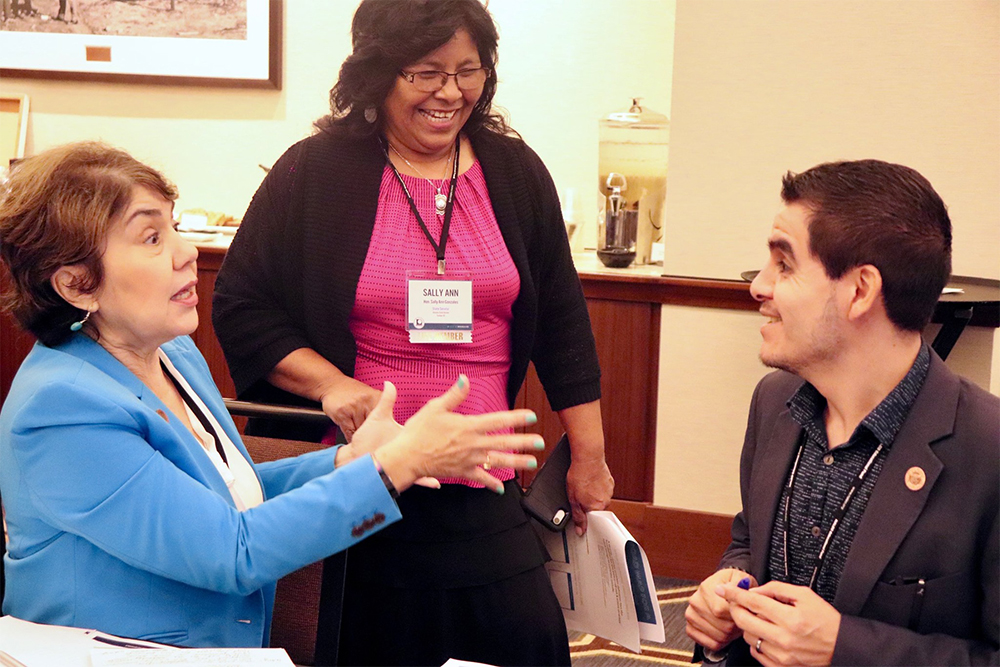By Stan Paul
Students at UCLA Luskin always have many opportunities to seek out public policy discourse and engage in political activities. But during the 2020 presidential election campaign, some of the opportunities for political engagement have been coming directly to them.
In December, the top Democratic contenders for the U.S. presidency were in Los Angeles for a closely watched debate that set the stage for the caucus and primary season soon to follow. And just a few weeks beforehand, students like first-year Master of Public Policy student Tamera Hyatte participated as questioners of presidential candidates during a live telecast of a town hall-style forum that focused on LGBTQ issues.
“Get ready, you’re going on!” was Hyatte’s cue. Moments later, she was asking Democratic candidate Beto O’Rourke face to face — and on split screen for viewers — what protections he, as president, would put in place to safeguard transgender women of color. In her question, Hyatt noted that transsexual women of color are killed at an alarming rate.
“I thought he answered it fairly well,” Hyatte said of the former Texas congressman’s response. “I think a lot of the candidates being asked specific questions were caught off-guard, because I don’t think these are issues they generally look into,” added the former middle-school teacher. She said her interests include educational issues affecting LGBTQ students in K-12 as well as education in communities of color.
Hyatte was among a sizable contingent of UCLA Luskin graduate and undergraduate students, faculty and staff who attended the Oct. 10 Democratic presidential forum in downtown Los Angeles that was hosted by CNN and the Human Rights Campaign Foundation. And she was among a handful selected to ask a question of a Democratic candidate at the forum, which included candidates Joe Biden, Cory Booker, Pete Buttigieg, Julian Castro, Kamala Harris, Amy Klobuchar, O’Rourke, Tom Steyer and Elizabeth Warren.
Ayse Seker, a second-year UCLA undergraduate student and public affairs pre-major at UCLA Luskin, was selected to question Booker, a U.S. senator from New Jersey, on the sometimes-conflicting juxtaposition of religious freedom and LGBTQ rights. Seker, who is also from New Jersey, said her question was based on her own experience attending a religious-based high school.
“I wish he could have gotten more specific on the issues of Catholic schools and the rights their students have; sometimes our very identities are at conflict with an institution’s canonical ideas,” Seker said. “But I do appreciate the messaging of his response, as it is important for there to be representation of someone who is both outspokenly religious and a champion for LGBTQ rights.”
In fall quarter, Seker was enrolled in Public Affairs 80, a prerequisite for the public affairs major that explores how the policy environment shapes human development. Her professor, Ian Holloway of UCLA Luskin Social Welfare, joined her at the event and provided useful commentary between candidates. She also appreciated his tips on public speaking prior to her on-camera moment.
Holloway said he was proud to see UCLA Luskin students asking tough questions of the candidates. “It was helpful for our students to think critically about how policies being debated, such as the trans military ban or pharmaceutical pricing, impact the lives of LGBTQ Americans.”
Kevin Medina MPP / MSW ’15 is now the capstone advisor and coordinator for UCLA Luskin’s undergraduate major. Like Hyatte and Seker, he had applied in early September to attend the event and ask a question, and he was notified that his question had been chosen just a couple of days before the forum. He asked California candidate Tom Steyer about his plan to combat “the erasure of LGBTQ Americans’ identities on the 2020 Census.”
“I hope asking this question on a national platform elevates the importance of this issue and puts it on the radar of those with the power to positively effect change,” Medina said after the event. He said the Census Bureau plans to collect data on same-sex partners. “However, this question does not gain information about transgender people or LGBTQ people who are single or not living with a same-gender partner.”
Hyatte, who studied journalism as an undergrad, was appreciative of the opportunity to become directly engaged in the electoral process. When she chose UCLA for graduate school, “I didn’t even know we would be able to participate in something like this.”
Reflecting on the experience afterward, Hyatte said, “I think a lot of the candidates may want to brush up more on informing themselves about the issues that are happening in the LGBTQ community.” At the same time, the forum — which was held the day before the 31st annual National Coming Out Day — was also instructive for her.
“Just for myself, sitting in the audience, there were questions brought up that I didn’t even think about asking, and it makes me think, ‘Wow, I want to look more into that and really see what’s going on,’” she said. “It makes me think about how I can also include LGBTQ issues into my research on education policy because I think that’s also relevant.”
Relevance was key for Seker as well. “Within public affairs classes, we’re constantly learning about the vast array of issues that plague our society and the institutions and their history that perpetuate them.” The town hall demonstrated how diverse and multifaceted the LGBTQ community is, she said, and it highlighted a number of LGBTQ-related issues and concerns “that find their roots in a myriad of intersecting oppressive systems.”
Being within the Luskin School means a nearly constant stream of interesting opportunities for political engagement, Seker said a few days after the forum. “The fact that this was only during Week 2 of fall quarter makes me eager and excited for all the future opportunities and events the Luskin School will offer me throughout the rest of this school year.”
And Seker is right — UCLA Luskin will host a full calendar of public events and politics-related opportunities for students and alumni through Election Day 2020.
